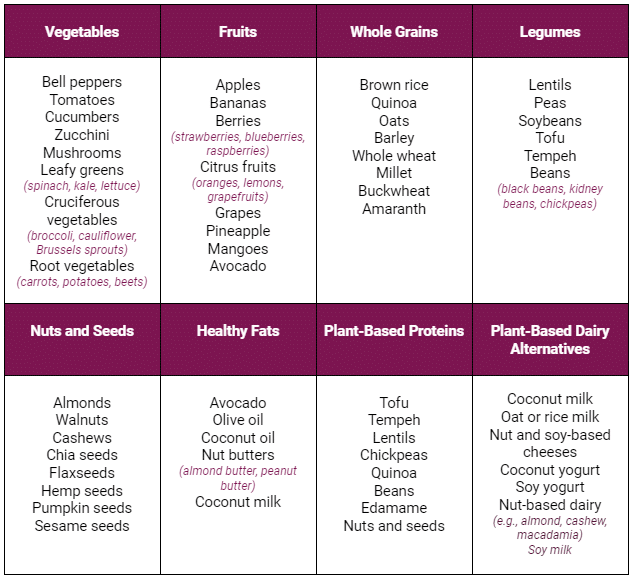
Over the past few years, plant-based diets have become increasingly popular as people recognize the incredible benefits of fueling their bodies with good nutrition. This article delves into why plant-based is better for your health and what foods you should consume as part of this diet.
What Is a Plant-Based Diet?
A plant-based diet is an eating regimen that focuses on whole, unprocessed foods derived from plants. It is a broad umbrella that encompasses a variety of eating habits, from strict veganism, which excludes all animal products, to more flexible versions like flexitarian or pescatarian diets that include some animal protein, albeit sparingly.
Plant-based nutrition emphasizes fruits, vegetables, whole grains, legumes, nuts, and seeds while minimizing or excluding animal products and processed foods. Individuals can ensure an adequate intake of essential nutrients, fiber, antioxidants, and phytochemicals that support overall health and well-being by including various plant-based foods.
Plant-Based Diet Benefits
This way of eating nourishes the body with nutrient-dense, natural foods. You can enjoy many benefits for your overall health and well-being through this diet. Here are the ten reasons why you should adopt plant-based nutrition.
1. Improved Heart Health
One significant plant-based diet health benefit is its positive impact on heart health. Plant-based foods are naturally low in saturated fats and cholesterol, which are often found in animal products. Reducing or eliminating these dietary components can lower your risk of developing high blood pressure, cardiovascular disease, and high cholesterol levels.
The high fiber content in plant-based foods also helps to regulate cholesterol levels by reducing cholesterol absorption and increasing cholesterol excretion.
Additionally, plant-based diets are rich in heart-healthy nutrients such as antioxidants, phytochemicals, and omega-3 fatty acids, further supporting cardiovascular health.
2. Weight Management
One of the key benefits of a plant-based diet is its effectiveness in weight management. Plant-based food sources are low in calories and higher in fiber, which can contribute to a feeling of fullness and satiety. It can lead to lower calorie intake and help with weight loss or maintenance.
3. Lower Cancer Risk
A plant-based diet has a link to a lower risk of various types of cancer. Fruits, whole grains, and vegetables are rich in antioxidants, phytochemicals, and fiber, which can help protect against cancer. Additionally, plant-based diets often limit or exclude processed meats and high-fat animal products, both of which have been linked to the development of certain cancers.
4. Keeps Your Gut Happy
Most plant-based foods contain high levels of fiber, which acts as a prebiotic, providing ample nourishment for beneficial gut bacteria. These bacteria can help improve digestion, enhance nutrient absorption, and support a healthy immune system. Including fermented plant-based foods, such as sauerkraut, kimchi, and tempeh, can also introduce probiotics to support gut health further.
5. Better Brain Health
Studies have suggested that a plant-based diet may contribute to better brain health and a reduced risk of cognitive decline. The abundance of anti-inflammatory compounds and antioxidants in plant-based foods can help protect brain cells from oxidative stress and inflammation.
Additionally, omega-3 fatty acids from plant sources like flaxseeds, chia seeds, and walnuts can support brain function and improve cognitive abilities.
6. Mitigates Diabetes Risk
Evidence shows that a plant-based diet reduces the risk of type 2 diabetes. Compared to animal-based foods, plant-based foods contain low amounts of saturated fats and are high in fiber. Both can help improve insulin sensitivity and control blood sugar levels.
The emphasis on whole grains, legumes, and vegetables in a plant-based diet ensures an even release of sugar into the bloodstream, protecting against blood sugar crashes and spikes.
7. Increased Energy Levels
Whole plant foods provide a rich source of vitamins, minerals, and complex carbohydrates essential for sustained energy throughout the day. Unlike processed foods that can cause energy crashes, plant-based meals nourish the body, providing a steady release of energy.
8. Promotes Healthy Skin
Fruits and vegetables are abundant in antioxidants and vitamins that promote skin health and combat oxidative stress. These nutrients help protect against the damaging effects of free radicals, which can lead to premature aging and skin damage.
9. Longevity and Disease Prevention
You provide the necessary tools to prevent and combat various health conditions by nourishing your body with nutrient-dense plant foods. Plant-based foods’ anti-inflammatory and antioxidant properties help protect against cardiovascular disease, certain cancers, and other age-related ailments.
10. Environmental Sustainability
A plant-based diet isn’t just good for you—it’s good for the planet, too. Animal agriculture is a significant contributor to deforestation, depletion of natural resources, and greenhouse gas emissions. By shifting towards a plant-based diet, you can significantly reduce their carbon footprint and promote sustainable food systems.
What Does a Plant-Based Diet Consist Of?
It’s important to note that you can customize the variety and combinations of foods based on personal preferences and dietary needs. The key to the best plant-based diet is prioritizing whole, nutrient-dense plant foods while minimizing processed and refined options.
Here is a list of some common and popular plant-based foods that you can include in a plant-based diet:

Tips for Transitioning to a Plant-Based Nutrition
Switching to a whole plant-based diet may seem overwhelming at first, but with a few simple tips, the process can become much smoother:
Start gradually
You don’t have to go entirely plant-based all at once. Begin by incorporating more plant-based meals into your weekly routine. Start with one or two meatless days and gradually increase as you become more comfortable.
Experiment with new recipes
Explore new plant-based recipes to add variety to your meals. Look for creative ways to incorporate vegetables, legumes, and whole grains into your favorite dishes.
Do meal planning
Make sure you plan your meals ahead of time for a balanced and nutritious plant-based diet. This step will help you stay organized and avoid consuming convenience or processed foods.
Educate yourself
Learn about the nutritional benefits of different plant-based foods to ensure you meet your dietary needs. Consult reliable sources or seek guidance from a registered dietitian if needed.
Frequently-Asked Questions
You might still have questions or reservations about transitioning to a plant-based diet. In this section, you’ll find answers to some of the most frequently asked questions.
1. Will I get enough protein on a plant-based diet?
“Where do you get your protein?” If you’ve been on a plant-based diet, you’ve probably heard this question many times. Contrary to popular belief, plant-based diets can supply all essential amino acids. Protein-rich plant foods include lentils, chickpeas, tofu, quinoa, and many more.
2. Can a plant-based diet provide all the necessary nutrients?
Yes, a well-planned plant-based diet can provide all the necessary nutrients. It is essential to include a variety of plant foods to ensure an adequate intake of protein, vitamins, minerals, and essential fatty acids. Supplementation may be necessary for specific nutrients like vitamin B12.
3. Is a plant-based diet suitable for athletes and active individuals?
Yes, a plant-based diet can meet the nutritional needs of athletes and active individuals. It can provide carbohydrates, proteins, and fats for energy and muscle recovery. Proper meal planning and attention to nutrient timing are essential for optimizing athletic performance on a plant-based diet.
4. Is a plant-based diet more expensive than a meat-based diet?
While some plant-based specialty products can be costly, a well-planned plant-based diet can be cost-effective. Staples such as grains, legumes, fruits, and vegetables are often affordable and can form the foundation of a nutritious plant-based diet. Seasonal and local produce can also be budget-friendly options.
5. Can children eat a plant-based diet?
Yes, children can thrive on a well-planned plant-based diet. It is vital to ensure they receive adequate nutrients, especially during periods of growth. Consulting with a pediatrician can help ensure children meet their nutrient needs while following a plant-based diet.
Fuel Your Body with Nature’s Power!
Embracing a plant-based diet can bring about remarkable benefits for your overall health and well-being.
By prioritizing whole foods derived from plants and gradually changing your eating habits, you can experience the positive impact of a plant-based lifestyle. So, why not embark on this journey and fuel your body with the abundant goodness nature offers? Your health and the planet will thank you!
At Premier Health & Wellness, we firmly believe that what you put on your plate can be the one factor in unlocking your best health. Our diabetes reversal and weight loss programs empower you to achieve a thriving life, and part of that is through adopting good nutrition, like a plant-based diet.
Moreover, our approach goes beyond just dietary changes. We understand that sustainable health is a holistic pursuit. That’s why our comprehensive programs also encompass exercise, stress management, support, and behavior modification techniques, ensuring a well-rounded approach tailored to your unique needs.
Join our Tribe today! Call us at 441-292-5111 or click the book a consultation button on our website to schedule an appointment today!
Disclaimer: The information provided on this blog is intended for educational and informational purposes only. It is not intended to be a substitute for professional medical advice, diagnosis, or treatment. When making substantial changes to your diet, speak with a dietitian or a healthcare professional to ensure you meet your nutritional requirements.
